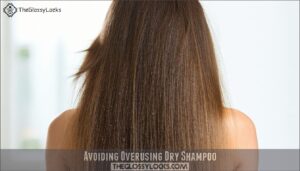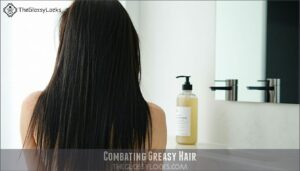This site is supported by our readers. We may earn a commission, at no cost to you, if you purchase through links.

This natural oil production is influenced by genetics, hormones, and how often you wash your hair.
Touching your hair transfers oils from fingers to strands, while pillowcases collect product residue and skin cells that transfer back to your hair.
Your scalp might also overproduce oil if you’re washing too frequently, creating a cycle where it compensates for stripped natural oils.
Stress and diet play roles too – what you eat directly impacts sebum production.
Simple nighttime adjustments can make a world of difference for your morning hair situation.
Table Of Contents
- Key Takeaways
- Greasy Hair Causes
- Why Hair Gets Greasy Overnight
- Preventing Overnight Greasiness
- Managing Oily Scalp
- Signs of Underlying Issues
- Combating Greasy Hair
- Frequently Asked Questions (FAQs)
- Why does my hair get greasy overnight?
- What does it mean when one’s hair is both greasy and has dandruff?
- What causes oily hair & greasy hair?
- How to prevent overnight greasy hair?
- Why does my hair get oily at night?
- Does not washing your hair often cause greasy hair?
- Why does my hair get so oily after sleeping?
- How should I sleep with my hair to make it less greasy?
- Can medications cause overnight hair greasiness?
- Does hair length affect oil distribution?
- Conclusion
Key Takeaways
- Your scalp continuously produces sebum while you sleep, with increased body temperature and friction against pillowcases spreading oils throughout your hair strands overnight.
- You’ll worsen overnight greasiness if you’re overwashing your hair, as this strips natural oils and triggers your sebaceous glands to produce even more sebum in compensation.
- Your hair texture and density directly impact oil visibility – if you have fine or low-density hair, you’ll notice greasiness faster as there’s less surface area to absorb sebum.
- You can reduce overnight greasiness by switching to silk pillowcases, loosely styling your hair before bed, maintaining a cooler bedroom temperature, and using clarifying shampoo once weekly.
Greasy Hair Causes
Your hair gets greasy overnight because sebaceous glands on your scalp continue producing sebum while you sleep, which is affected by factors like your hair texture, scalp type, hormones, and lifestyle choices.
The combination of increased body temperature during sleep, friction against your pillowcase, and your natural oil production cycle creates the perfect conditions for that frustrating morning greasiness you often wake up to, influenced by your hormones.
Hair Texture and Density
Understanding your hair texture and density can explain why you wake up with oily strands.
Your hair’s physical structure substantially impacts how quickly it gets greasy overnight.
Four factors that determine how quickly oil spreads through your hair:
- Fine hair shows greasiness faster as it has less surface to absorb sebum
- Thick hair can hide oiliness longer
- Low density hair reveals scalp oils more readily
- High density provides more strands to distribute oils
These factors, including density, substantially influence the appearance and management of oily hair.
Scalp Type
Your scalp type directly influences how greasy your hair gets overnight.
Oily scalps naturally produce more sebum than dry or normal types.
This excess sebum production creates that frustrating morning oil slick.
Your scalp’s pH balance also matters—when disrupted, it triggers hair follicles to overproduce oil.
Many with oily hair overnight struggle with inadequate scalp hydration, which paradoxically signals glands to pump out more oil.
This issue is closely related to the scalp’s natural tendency to produce sebum.
Hormonal Fluctuations
During hormonal fluctuations, your body’s oil glands go into overdrive, causing that frustrating overnight greasiness.
Your sebum production doesn’t sleep when you do!
Key hormonal triggers include:
- Menstrual cycle changes (especially pre-period)
- Pregnancy sebum increases
- Puberty changes affecting scalp oil balance
- Stress hormones like cortisol stimulating oil production
These hormone imbalances directly impact how much oil your scalp produces while you sleep, leading to sebum production changes.
Diet and Lifestyle
Beyond hormonal shifts, what you eat and how you live directly impacts your hair’s oil production.
Your diet and lifestyle choices shape your scalp’s oil factory, influencing how fresh or greasy your hair feels each morning.
Your daily choices can turn your scalp into an oil factory overnight.
| Factor | Effect on Hair |
|---|---|
| Dietary Fats | High saturated fat intake increases sebum production |
| Hydration Levels | Dehydration triggers compensatory oil production |
| Exercise Impact | Sweat buildup without proper cleansing causes greasiness |
| Alcohol/Smoking | Both disrupt hormonal balance and increase oil production |
The factors that affect hair oil production include dietary choices, hydration levels, exercise impact, and the use of alcohol and smoking, all of which can significantly alter the scalp’s oil production levels.
Why Hair Gets Greasy Overnight
You’ve noticed your clean hair turns greasy by morning? You’re not alone. While genetics affect oil production, several factors contribute to overnight hair grease.
Your sebaceous glands don’t take breaks when you sleep. Instead, they continue sebum production throughout the night. This natural process intensifies due to:
- Your body temperature rises during sleep, stimulating scalp sebum production and helping oils travel down hair shafts
- Sleeping positions create friction against pillowcase material, distributing scalp oils through your strands
- Nighttime products can trap excessive oil production, creating buildup
Room temperature matters too. Warm, poorly ventilated bedrooms increase sweating and sebum overproduction. Understanding your hair type’s oil production can also shed light on this issue. Additionally, your circadian rhythm can affect overnight scalp oil secretion, with some people experiencing heightened output during rest periods.
Understanding these factors helps address the root causes of your greasy morning hair situation.
Preventing Overnight Greasiness
You can take control of overnight oil buildup with simple changes to your bedtime routine.
These practical adjustments prevent sebum from spreading through your hair while you sleep, helping you wake up with fresher-looking strands and take control of overnight oil buildup.
Switching Pillowcases
Your dirty pillowcase might be the secret culprit behind your morning hair woes.
Cotton pillowcases absorb facial oils and transfer them to your hair while you sleep, increasing overnight grease. Replace them every 2-3 days to minimize oil transfer.
For even better results, invest in a silk pillowcase—they reduce hair friction and help maintain scalp sebum production at normal levels, keeping your strands fresher longer.
You can find a variety of silk pillowcase options online to achieve better results and reduce hair friction with a silk pillowcase.
Loosely Styling Hair
During sleep, your hairstyle can substantially impact hair oiliness.
Opt for gentle hairstyles like loose braids or high buns that minimize scalp contact with your face and pillow.
Different bun variations and braid benefits include reduced tangling and less oil transfer.
Choose a scrunchie rather than tight elastics to prevent breakage.
For those with an oily scalp, these styling techniques help maintain clean-looking hair type longer by keeping natural oils at the roots and reducing oiliness.
Cleaning Skin Before Bed
Before bed, wash your face thoroughly to remove makeup, facial oils, and skincare residues.
These can transfer to your pillowcase, leading to oil buildup on your hair. Don’t forget hand hygiene—touching your hair with oily hands increases overnight greasiness.
Proper nighttime skincare reduces sebum production and minimizes oil transfer, helping you wake up with a fresher, less oily scalp.
Consider using a gentle, hydrating moisturizer as part of your routine to achieve a fresher and less oily scalp.
Cooling and Ventilating Bedroom
After washing your face, don’t forget your bedroom environment contributes to greasy hair too.
Your room temperature directly affects sebum production—keep it cooler (65-68°F) to reduce nighttime oil production.
Improve air circulation with a fan or open window to minimize sweating.
Consider a dehumidifier if your space feels muggy.
Quality window coverings can help maintain ideal temperatures, while proper bedroom ventilation enhances overall air quality and keeps your sleep environment balanced, ensuring a good night’s sleep with minimal sweating.
Managing Oily Scalp
You’ll need to address your oil production at the source by balancing your washing routine and selecting products specifically formulated for oily scalps.
Your scalp’s sebaceous glands respond to both internal factors like hormones and external factors like product buildup, making a targeted approach essential for lasting results.
Reducing Overwashing
You might think daily washing keeps greasiness at bay, but it actually triggers your sebum glands to work overtime.
Start a gradual reduction in your hair washing frequency, cutting back to every other day, then every two to three days.
Your scalp needs time to balance oil production naturally, and focus shampoo application at the roots where product buildup occurs.
Consider gentler shampoo alternatives to maintain scalp health.
Avoiding Overusing Dry Shampoo
Relying too heavily on dry shampoo creates product buildup that clogs hair follicles and ironically increases scalp oil production. While it’s a helpful tool for extending wash days, moderation is key.
Here are 5 signs you’re overusing dry shampoo:
- White residue that won’t brush out
- Scalp itchiness or flaking
- Hair feeling gritty or stiff
- Increased oiliness between washes
- Dull, lifeless appearance despite application
Alternate between different oil control methods and check product ingredients for potentially irritating components. Some people prefer to use dry shampoo alternatives to avoid buildup, which can lead to a healthier scalp and better hair quality.
Protecting Scalp From Irritants
While dry shampoo helps temporarily, your scalp needs protection from irritants too.
Your hair products might contain allergens causing itchiness and increased sebum gland activity.
Check product ingredients for potential irritants and switch to gentler formulations when needed.
Incorporate regular scalp exfoliation to remove buildup that disrupts scalp balance.
For a deeper cleanse, consider using clarifying shampoos regularly to remove excess oil.
Consider pillowcase material as well—silk or satin prevents friction while cotton can transfer pollutants to your hair.
Maintaining good air quality in your bedroom also supports overall scalp health.
Signs of Underlying Issues
If you’re waking up with oil-slicked hair despite good hygiene habits, you might’ve an underlying condition affecting your scalp’s oil production.
Your persistently greasy hair can signal hormonal imbalances, scalp disorders, or environmental factors that require medical attention rather than just different shampoo.
Hormonal Imbalances
Beyond your daily routines, those frustrating greasy strands might signal hormonal imbalances at work.
Your body’s hormonal fluctuations during puberty, pregnancy, menopause, or menstrual cycles directly impact sebum production.
Stress effects can trigger excess oil too, and even medications like birth control can increase sebum gland activity.
If you notice cyclical patterns in hair greasiness—especially tied to monthly cycles or significant life changes—your hormones might be the culprit behind those overnight oil slicks.
Scalp Conditions
Scalp conditions like seborrheic dermatitis, folliculitis, and dandruff trigger excessive sebum production, leaving your hair greasy overnight.
Fungal infections or scalp psoriasis may also disrupt oil balance.
Hormonal changes and certain scalp types can worsen oiliness.
Identifying the specific issue is key—irritated scalp oil glands often require gentle cleansing and targeted treatment, like antifungal shampoos, to restore balance.
Poor Hair Care Routine
Your hair care routine might be sabotaging your locks overnight.
Incorrect washing techniques, like inadequate scalp massage or insufficient rinsing, lead directly to oily roots. Product buildup from using the wrong formulations or applying conditioner to your scalp creates greasy hair by morning.
Overwashing strips natural oils, triggering your scalp to produce more sebum as compensation. These common hair care mistakes often go unnoticed but substantially impact scalp health.
Implementing sulfate-free shampoos can help maintain the hair’s natural pH balance.
Environmental Factors
While fixing your hair care routine helps, your environment plays a significant role too.
Indoor air pollution collects on your scalp, blocking oil glands. Water hardness in your area can affect how products rinse out, leading to product buildup.
Humidity levels and seasonal changes directly impact oil production.
Even your sleep environment matters—night sweats from warm rooms increase body temperature, stimulating more oil production overnight.
Combating Greasy Hair
You can take control of your greasy hair situation with targeted strategies that address both internal and external factors.
Regular use of clarifying shampoo combined with gentle scalp exfoliation will remove buildup and regulate oil production for noticeably fresher hair.
Using Clarifying Shampoo
When underlying issues persist, your hair care needs a reset. Clarifying shampoo acts as a deep cleaner for your scalp, removing what regular shampoos can’t tackle.
For effective buildup removal with clarifying shampoo:
- Use only once weekly to prevent overdrying
- Focus application directly on the scalp
- Look for ingredients like salicylic acid or tea tree oil
- Thoroughly rinse to remove all product residue
Consider purchasing clarifying shampoo for best results. This oily scalp treatment targets greasy hair causes at the source.
Exfoliating Scalp
Buildup on your scalp acts like a magnet for excess oil.
Regular exfoliation removes dead skin cells and product residue that contribute to overnight greasiness.
Using a scalp scrub 1-2 times weekly creates a clean foundation that helps control oil production.
Chemical exfoliants containing AHAs or BHAs effectively dissolve buildup, while exfoliation tools like scalp brushes boost circulation.
DIY scalp scrubs with sugar or salt offer affordable alternatives for maintaining scalp balance, and regular use can lead to a clean foundation.
Maintaining Healthy Lifestyle
Beyond scalp treatments, your overall wellness directly impacts hair oiliness reasons.
A balanced diet rich in zinc and B vitamins helps regulate sebum production.
Stress reduction through meditation or yoga can lower hormones that trigger excess oil.
Regular exercise improves circulation to your scalp, while proper hydration habits and quality sleep naturally balance oil production.
Drinking at least eight glasses of water daily helps flush toxins that contribute to overnight greasiness, and staying hydrated is crucial for maintaining a healthy balance, with proper hydration habits being essential for overall wellness.
Avoiding Hot Showers Before Bed
While keeping a healthy lifestyle helps control overall scalp oil, your evening shower routine directly impacts hair oiliness reasons.
Hot showers before bed substantially increase sebum production by stimulating your scalp’s oil glands.
To reduce overnight greasiness, adjust your bedtime routine:
- Use lukewarm or cool water instead of hot
- Limit shower time to under 10 minutes
- Avoid direct scalp massage with hot water
- Thoroughly dry hair before sleeping
This simple water temperature change helps maintain natural oil regulation through the night, and is a key part of a bedtime routine that can help with overnight greasiness.
Frequently Asked Questions (FAQs)
Why does my hair get greasy overnight?
Your tresses aren’t misbehaving – your scalp produces oils overnight while you sleep.
Body heat, friction from pillowcases, and natural sebum production continue during rest.
Your circadian rhythm also affects oil secretion patterns.
What does it mean when one’s hair is both greasy and has dandruff?
This combination typically indicates seborrheic dermatitis, where your sebaceous glands overproduce oil while your scalp sheds skin cells abnormally.
You’ll need specialized anti-dandruff shampoo that also controls oil production to address both issues effectively.
What causes oily hair & greasy hair?
Over 70% of people with oily hair have overactive sebaceous glands. Your scalp naturally produces sebum, which can be worsened by hormonal changes, genetics, overwashing, product buildup, or environmental factors.
How to prevent overnight greasy hair?
Apply dry shampoo before bed, use a silk pillowcase, put your hair in a loose bun, and wash pillowcases weekly.
These steps help absorb excess oil and reduce friction that spreads sebum.
Why does my hair get oily at night?
As you sleep, your scalp works overtime.
Your body’s temperature rises during sleep, stimulating sebaceous glands to produce oil.
This, combined with pillow friction and nighttime sweating, leaves your hair looking greasy by morning.
Does not washing your hair often cause greasy hair?
No, infrequent washing doesn’t cause greasy hair.
Your scalp naturally produces oils regardless of washing schedule.
However, proper washing techniques help manage oil buildup and prevent excess grease from accumulating on your strands, which is a key factor in maintaining healthy hair.
Why does my hair get so oily after sleeping?
Your scalp’s like a midnight oil factory, working while you rest.
Sebum production continues during sleep, and friction against pillowcases spreads oils throughout your hair.
Heat and sweat also contribute to overnight greasiness.
How should I sleep with my hair to make it less greasy?
Use a silk pillowcase and style your hair in a high bun or "pineapple" with a scrunchie. You’ll also want to change pillowcases weekly and apply dry shampoo before bed.
Can medications cause overnight hair greasiness?
Yes, certain medications can increase oil production in your scalp.
Hormonal treatments, steroids, and some psychiatric drugs often trigger excess sebum production, making your hair appear greasier overnight even with proper care, due to the excess sebum.
Does hair length affect oil distribution?
Over 60% of people with longer hair report faster oil visibility.
Your hair length does impact oil distribution—shorter styles keep oils concentrated at the roots, while longer hair lets oils travel down the shaft more easily, which can be related to faster oil visibility.
Conclusion
While you might question if you can actually control why your hair gets greasy overnight, implementing these seven solutions will make a noticeable difference.
By adjusting your bedtime routine, choosing proper pillowcases, and understanding your unique scalp needs, you’ll wake up with fresher locks.
Remember that consistency matters—your scalp needs time to regulate oil production, and with these targeted approaches, you’ll finally solve the mystery of why your hair gets greasy overnight and enjoy cleaner hair for longer.
- https://heymane.com/blogs/mane-stream/why-does-hair-get-greasy-overnight?srsltid=AfmBOoqa8Rheh915SUjErv8Y8l0583_48gpspRD_atobE3y0BOL0D4rk
- https://www.beautybay.com/edited/stop-hair-greasy-overnight/
- https://www.livingproof.com/hair-101/why-is-my-hair-so-oily.html?srsltid=AfmBOor21eG5rKTqRTEt3nsEfPI6dt_FExElyLvImj9h4AzyPma2rBDQ
- https://www.tiktok.com/discover/how-to-make-sure-hair-doesnt-get-greasy-overnight
- https://www.wikihow.com/Prevent-Hair-from-Getting-Greasy-Overnight














